Question Number 124076 by TANMAY PANACEA last updated on 30/Nov/20
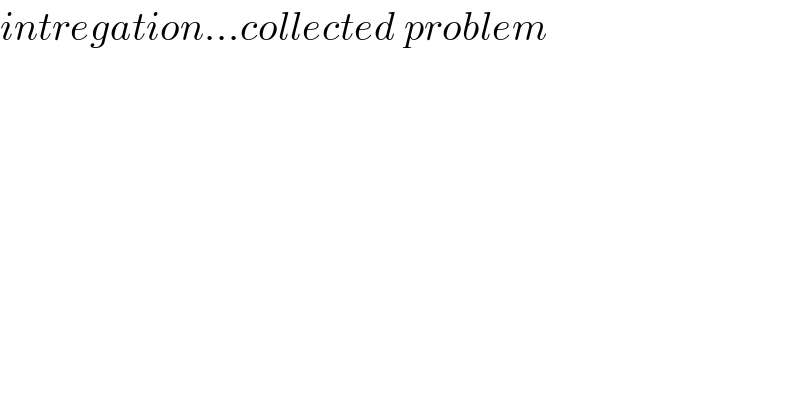
$${intregation}…{collected}\:{problem} \\ $$
Commented by TANMAY PANACEA last updated on 30/Nov/20

Commented by TANMAY PANACEA last updated on 30/Nov/20

Commented by TANMAY PANACEA last updated on 30/Nov/20

Commented by TANMAY PANACEA last updated on 30/Nov/20

Commented by TANMAY PANACEA last updated on 30/Nov/20

$$\boldsymbol{{calculus}}\:\boldsymbol{{collected}}\:\boldsymbol{{roblem}} \\ $$
Commented by TANMAY PANACEA last updated on 30/Nov/20

Commented by TANMAY PANACEA last updated on 30/Nov/20

Commented by TANMAY PANACEA last updated on 30/Nov/20

Commented by TANMAY PANACEA last updated on 30/Nov/20
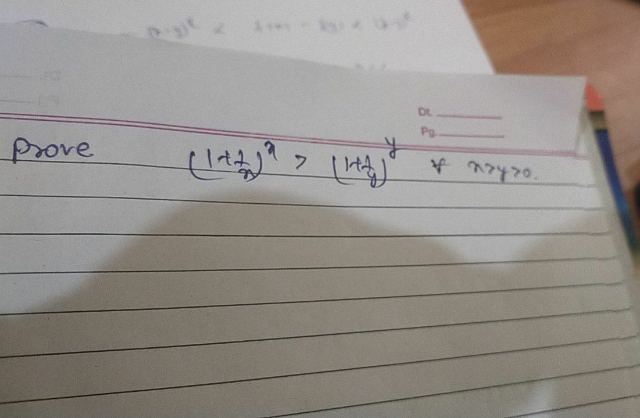
Commented by TANMAY PANACEA last updated on 30/Nov/20

Commented by TANMAY PANACEA last updated on 30/Nov/20

Commented by TANMAY PANACEA last updated on 30/Nov/20

Commented by Dwaipayan Shikari last updated on 30/Nov/20
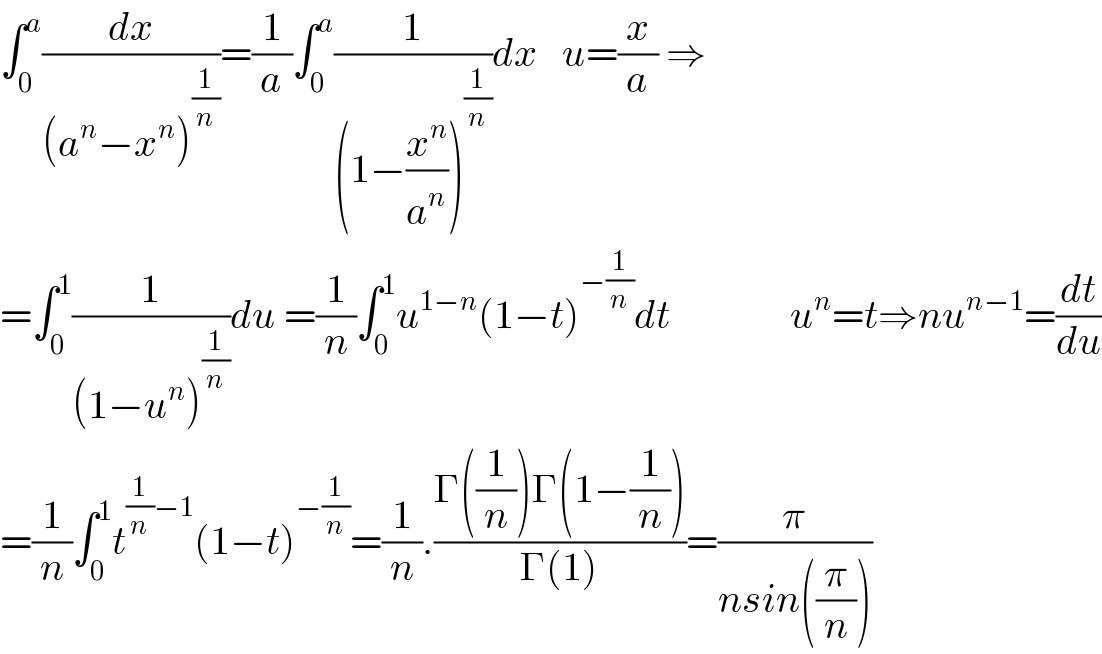
$$\int_{\mathrm{0}} ^{{a}} \frac{{dx}}{\left({a}^{{n}} −{x}^{{n}} \right)^{\frac{\mathrm{1}}{{n}}} }=\frac{\mathrm{1}}{{a}}\int_{\mathrm{0}} ^{{a}} \frac{\mathrm{1}}{\left(\mathrm{1}−\frac{{x}^{{n}} }{{a}^{{n}} }\right)^{\frac{\mathrm{1}}{{n}}} }{dx}\:\:\:{u}=\frac{{x}}{{a}}\:\Rightarrow \\ $$$$=\int_{\mathrm{0}} ^{\mathrm{1}} \frac{\mathrm{1}}{\left(\mathrm{1}−{u}^{{n}} \right)^{\frac{\mathrm{1}}{{n}}} }{du}\:=\frac{\mathrm{1}}{{n}}\int_{\mathrm{0}} ^{\mathrm{1}} {u}^{\mathrm{1}−{n}} \left(\mathrm{1}−{t}\right)^{−\frac{\mathrm{1}}{{n}}} {dt}\:\:\:\:\:\:\:\:\:\:\:\:\:\:\:{u}^{{n}} ={t}\Rightarrow{nu}^{{n}−\mathrm{1}} =\frac{{dt}}{{du}} \\ $$$$=\frac{\mathrm{1}}{{n}}\int_{\mathrm{0}} ^{\mathrm{1}} {t}^{\frac{\mathrm{1}}{{n}}−\mathrm{1}} \left(\mathrm{1}−{t}\right)^{−\frac{\mathrm{1}}{{n}}} =\frac{\mathrm{1}}{{n}}.\frac{\Gamma\left(\frac{\mathrm{1}}{{n}}\right)\Gamma\left(\mathrm{1}−\frac{\mathrm{1}}{{n}}\right)}{\Gamma\left(\mathrm{1}\right)}=\frac{\pi}{{nsin}\left(\frac{\pi}{{n}}\right)}\: \\ $$
Commented by TANMAY PANACEA last updated on 30/Nov/20

$${thank}\:{you}\:{but}\:{question}\:{no}\:\mathrm{22}\:{pls} \\ $$
Commented by mnjuly1970 last updated on 30/Nov/20
![note:: Γ(x)Γ(1−x)=(π/(sin(πx))) note:: ∫_0 ^( π) ln(sin(x))dx=−πln(2) Ω=∫_0 ^( 1) ln(Γ(x))dx Ω=∫_0 ^( 1) ln(Γ(1−x))dx 2Ω=∫_0 ^( 1) ln[(Γ(x)Γ(1−x))]dx 2Ω =^(euler reflection formula) ∫_0 ^( 1) ln((π/(sin(πx))))dx =ln(π)−∫_0 ^( 1) ln(sin(πx))dx =^(πx=t) ln(π)−(1/π)∫_0 ^( π) ln(sin(x))dx =ln(π)−(1/π)(−πln(2)) =ln(π)+ln(2)=ln(2π) ∴ Ω=(1/2)ln(2π)=ln((√(2π)) )✓](https://www.tinkutara.com/question/Q124097.png)
$$\:\:\:\:{note}::\:\Gamma\left({x}\right)\Gamma\left(\mathrm{1}−{x}\right)=\frac{\pi}{{sin}\left(\pi{x}\right)} \\ $$$$\:{note}::\:\:\int_{\mathrm{0}} ^{\:\pi} {ln}\left({sin}\left({x}\right)\right){dx}=−\pi{ln}\left(\mathrm{2}\right) \\ $$$$\Omega=\int_{\mathrm{0}} ^{\:\mathrm{1}} {ln}\left(\Gamma\left({x}\right)\right){dx} \\ $$$$\Omega=\int_{\mathrm{0}} ^{\:\mathrm{1}} {ln}\left(\Gamma\left(\mathrm{1}−{x}\right)\right){dx} \\ $$$$\:\mathrm{2}\Omega=\int_{\mathrm{0}} ^{\:\mathrm{1}} {ln}\left[\left(\Gamma\left({x}\right)\Gamma\left(\mathrm{1}−{x}\right)\right)\right]{dx} \\ $$$$\:\:\mathrm{2}\Omega\:\overset{{euler}\:{reflection}\:{formula}} {=}\int_{\mathrm{0}} ^{\:\mathrm{1}} {ln}\left(\frac{\pi}{{sin}\left(\pi{x}\right)}\right){dx} \\ $$$$={ln}\left(\pi\right)−\int_{\mathrm{0}} ^{\:\mathrm{1}} {ln}\left({sin}\left(\pi{x}\right)\right){dx} \\ $$$$\overset{\pi{x}={t}} {=}{ln}\left(\pi\right)−\frac{\mathrm{1}}{\pi}\int_{\mathrm{0}} ^{\:\pi} {ln}\left({sin}\left({x}\right)\right){dx} \\ $$$$={ln}\left(\pi\right)−\frac{\mathrm{1}}{\pi}\left(−\pi{ln}\left(\mathrm{2}\right)\right) \\ $$$$={ln}\left(\pi\right)+{ln}\left(\mathrm{2}\right)={ln}\left(\mathrm{2}\pi\right) \\ $$$$\therefore\:\:\Omega=\frac{\mathrm{1}}{\mathrm{2}}{ln}\left(\mathrm{2}\pi\right)={ln}\left(\sqrt{\mathrm{2}\pi}\:\right)\checkmark \\ $$
Commented by TANMAY PANACEA last updated on 30/Nov/20

$${excellent} \\ $$
Commented by mnjuly1970 last updated on 30/Nov/20

$${you}\:{are}\:{welcom}\:{sir}\:{tanmay}.. \\ $$
Commented by Dwaipayan Shikari last updated on 30/Nov/20
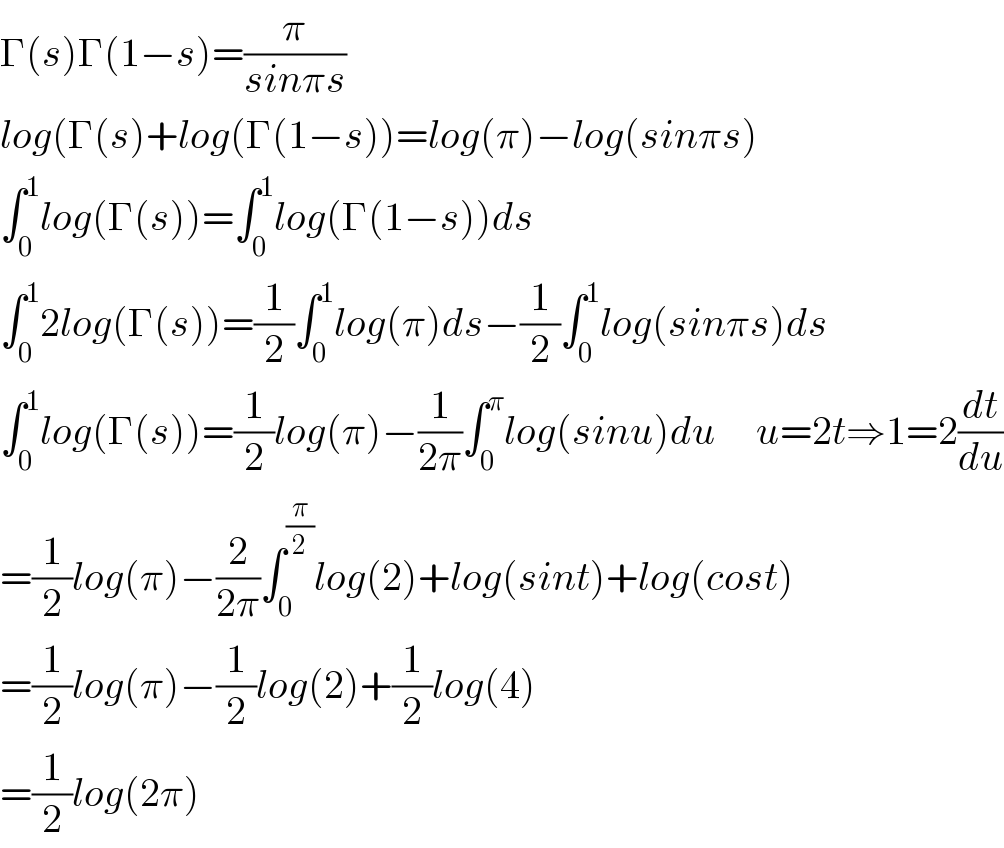
$$\Gamma\left({s}\right)\Gamma\left(\mathrm{1}−{s}\right)=\frac{\pi}{{sin}\pi{s}} \\ $$$${log}\left(\Gamma\left({s}\right)+{log}\left(\Gamma\left(\mathrm{1}−{s}\right)\right)={log}\left(\pi\right)−{log}\left({sin}\pi{s}\right)\right. \\ $$$$\int_{\mathrm{0}} ^{\mathrm{1}} {log}\left(\Gamma\left({s}\right)\right)=\int_{\mathrm{0}} ^{\mathrm{1}} {log}\left(\Gamma\left(\mathrm{1}−{s}\right)\right){ds} \\ $$$$\int_{\mathrm{0}} ^{\mathrm{1}} \mathrm{2}{log}\left(\Gamma\left({s}\right)\right)=\frac{\mathrm{1}}{\mathrm{2}}\int_{\mathrm{0}} ^{\mathrm{1}} {log}\left(\pi\right){ds}−\frac{\mathrm{1}}{\mathrm{2}}\int_{\mathrm{0}} ^{\mathrm{1}} {log}\left({sin}\pi{s}\right){ds} \\ $$$$\int_{\mathrm{0}} ^{\mathrm{1}} {log}\left(\Gamma\left({s}\right)\right)=\frac{\mathrm{1}}{\mathrm{2}}{log}\left(\pi\right)−\frac{\mathrm{1}}{\mathrm{2}\pi}\int_{\mathrm{0}} ^{\pi} {log}\left({sinu}\right){du}\:\:\:\:\:{u}=\mathrm{2}{t}\Rightarrow\mathrm{1}=\mathrm{2}\frac{{dt}}{{du}} \\ $$$$=\frac{\mathrm{1}}{\mathrm{2}}{log}\left(\pi\right)−\frac{\mathrm{2}}{\mathrm{2}\pi}\int_{\mathrm{0}} ^{\frac{\pi}{\mathrm{2}}} {log}\left(\mathrm{2}\right)+{log}\left({sint}\right)+{log}\left({cost}\right) \\ $$$$=\frac{\mathrm{1}}{\mathrm{2}}{log}\left(\pi\right)−\frac{\mathrm{1}}{\mathrm{2}}{log}\left(\mathrm{2}\right)+\frac{\mathrm{1}}{\mathrm{2}}{log}\left(\mathrm{4}\right) \\ $$$$=\frac{\mathrm{1}}{\mathrm{2}}{log}\left(\mathrm{2}\pi\right) \\ $$
Commented by Dwaipayan Shikari last updated on 30/Nov/20
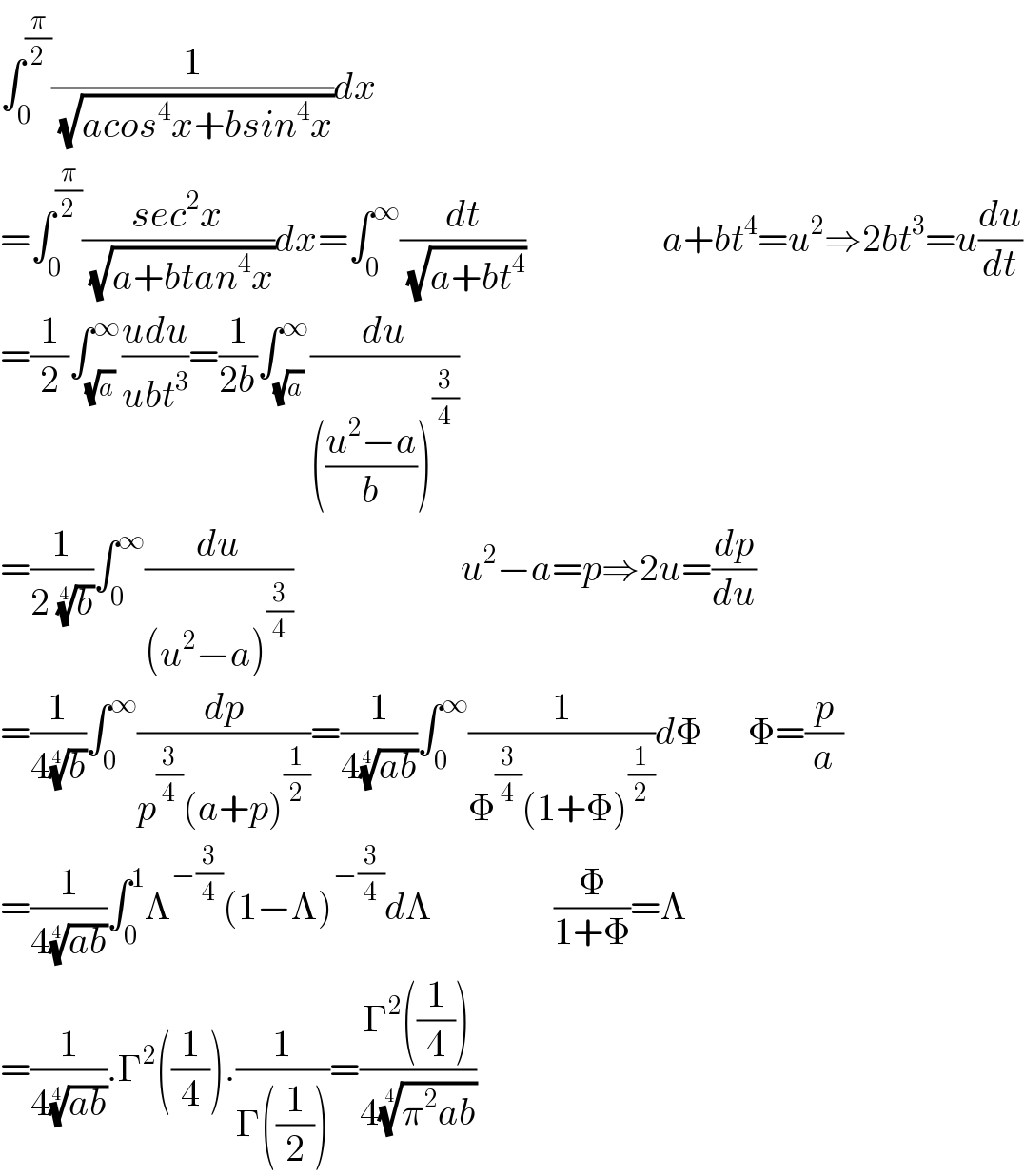
$$\int_{\mathrm{0}} ^{\frac{\pi}{\mathrm{2}}} \frac{\mathrm{1}}{\:\sqrt{{acos}^{\mathrm{4}} {x}+{bsin}^{\mathrm{4}} {x}}}{dx} \\ $$$$=\int_{\mathrm{0}} ^{\frac{\pi}{\mathrm{2}}} \frac{{sec}^{\mathrm{2}} {x}}{\:\sqrt{{a}+{btan}^{\mathrm{4}} {x}}}{dx}=\int_{\mathrm{0}} ^{\infty} \frac{{dt}}{\:\sqrt{{a}+{bt}^{\mathrm{4}} }}\:\:\:\:\:\:\:\:\:\:\:\:\:\:\:\:\:\:{a}+{bt}^{\mathrm{4}} ={u}^{\mathrm{2}} \Rightarrow\mathrm{2}{bt}^{\mathrm{3}} ={u}\frac{{du}}{{dt}} \\ $$$$=\frac{\mathrm{1}}{\mathrm{2}}\int_{\sqrt{{a}}} ^{\infty} \frac{{udu}}{{ubt}^{\mathrm{3}} }=\frac{\mathrm{1}}{\mathrm{2}{b}}\int_{\sqrt{{a}}} ^{\infty} \frac{{du}}{\left(\frac{{u}^{\mathrm{2}} −{a}}{{b}}\right)^{\frac{\mathrm{3}}{\mathrm{4}}} } \\ $$$$=\frac{\mathrm{1}}{\mathrm{2}\:\sqrt[{\mathrm{4}}]{{b}}}\int_{\mathrm{0}} ^{\infty} \frac{{du}}{\left({u}^{\mathrm{2}} −{a}\right)^{\frac{\mathrm{3}}{\mathrm{4}}} }\:\:\:\:\:\:\:\:\:\:\:\:\:\:\:\:\:\:\:\:\:\:{u}^{\mathrm{2}} −{a}={p}\Rightarrow\mathrm{2}{u}=\frac{{dp}}{{du}} \\ $$$$=\frac{\mathrm{1}}{\mathrm{4}\sqrt[{\mathrm{4}}]{{b}}}\int_{\mathrm{0}} ^{\infty} \frac{{dp}}{{p}^{\frac{\mathrm{3}}{\mathrm{4}}} \left({a}+{p}\right)^{\frac{\mathrm{1}}{\mathrm{2}}} }=\frac{\mathrm{1}}{\mathrm{4}\sqrt[{\mathrm{4}}]{{ab}}}\int_{\mathrm{0}} ^{\infty} \frac{\mathrm{1}}{\Phi^{\frac{\mathrm{3}}{\mathrm{4}}} \left(\mathrm{1}+\Phi\right)^{\frac{\mathrm{1}}{\mathrm{2}}} }{d}\Phi\:\:\:\:\:\:\Phi=\frac{{p}}{{a}} \\ $$$$=\frac{\mathrm{1}}{\mathrm{4}\sqrt[{\mathrm{4}}]{{ab}}}\int_{\mathrm{0}} ^{\mathrm{1}} \Lambda^{−\frac{\mathrm{3}}{\mathrm{4}}} \left(\mathrm{1}−\Lambda\right)^{−\frac{\mathrm{3}}{\mathrm{4}}} {d}\Lambda\:\:\:\:\:\:\:\:\:\:\:\:\:\:\:\:\frac{\Phi}{\mathrm{1}+\Phi}=\Lambda \\ $$$$=\frac{\mathrm{1}}{\mathrm{4}\sqrt[{\mathrm{4}}]{{ab}}}.\Gamma^{\mathrm{2}} \left(\frac{\mathrm{1}}{\mathrm{4}}\right).\frac{\mathrm{1}}{\Gamma\left(\frac{\mathrm{1}}{\mathrm{2}}\right)}=\frac{\Gamma^{\mathrm{2}} \left(\frac{\mathrm{1}}{\mathrm{4}}\right)}{\mathrm{4}\sqrt[{\mathrm{4}}]{\pi^{\mathrm{2}} {ab}}} \\ $$
